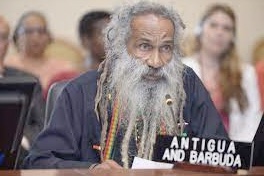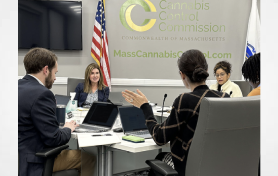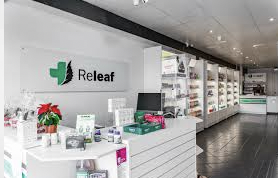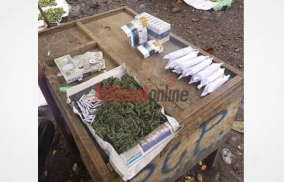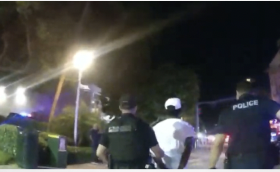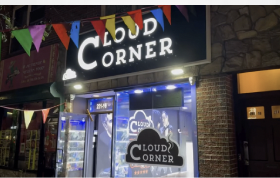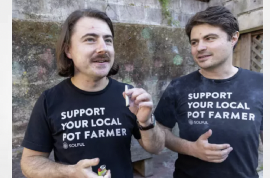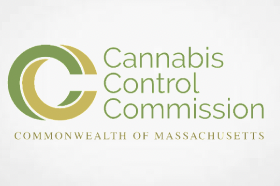The PM said he would like to work with the Rastafari community to develop the cannabis industry and in agriculture to combat food insecurity
ANTIGUA AND Barbuda has become the first Caribbean country to grant the Rastafari community official sacramental authorisation to grow cannabis.
Last week, members of Antigua and Barbuda’s Rastafari community were presented with their legal authorisation during a historic signing ceremony at the Prime Minister’s Office.
Prime Minister Gaston Browne praised the Rastafari community for their resilience over the years and granted religious and cultural group the landmark authorising under the 2018 Cannabis Act.
At a special ceremony, renowned Rastafari leaders, Glasford “King Sagyefo” Mack of the Nyabinghi Theocracy Church, Kiyode Erasto Straker of the RasFreeman Foundation for the Unification of Rastafari, and Kenrick Lloyd of the Wan Love Chant were presented with certificates by the Medicinal Cannabis Authority (MCA), which will legally allow them the right to cultivate cannabis for religious purposes.
“I believe, as a faith-based institution, that your organisation should be respected by all,” the Prime Minister said.
“We have adopted many European and non-European religions and we have a Pan-African religion … and instead of embracing it, we have sought to destroy it … I want to encourage you to stand your ground [and] continue to exercise that resilience.”
The PM said there needs to be more collaboration between his government and Rastafari community in areas like developing the cannabis industry and in agriculture – to help ensure food security on the twin islands.
“One of the areas that we are very pleased … the Rastafari community is well vested, is agriculture and I am hoping that we can have a stronger relationship with the various organisations … to increase food production,” Mr Browne said.
He also added he would like the community to assist where they can in preventing youth in Antigua and Barbuda from using cannabis.
“The use of cannabis by the youth is strictly prohibited by law and we also want to appeal to the Rastafari community to help us to uphold the law and the standards that the government has put in place to protect our youth,” he added.
The new changes make Antigua and Barbuda the first country in the Caribbean to document the right of Rastafari to use cannabis as a sacrament.
At the presentation, MCA Director Regis Burton hailed the occasion as an important milestone for the Rasta community.
“We know that the history of cannabis has been a long journey and the history of Rastafari has been a tedious one, and we are here to acknowledge the rights … of the Rastafari community,” Mr Burton said.
MCA Chairman Daven Joseph acknowledged the significant of the sacramental certificates not just for Antigua and Barbuda, but the rest of the Caribbean.
Mr Joseph said: “Antigua and Barbuda is the first in country in the Caribbean that is making the sacramental authorisation lawful—not Jamaica, not St Lucia, [and] not Trinidad and Tobago — so we will stand as a beacon for human rights for the Rastafari movement in the Caribbean.”
The government and MCA said it was vital that the Rastafari community are able to reap economic benefits from the growing medical cannabis industry, having been advocates of its medicinal benefits of the herb for several decades.
Rastafari elder Glasford “King Sagyefo” Mack of the Nyabinghi Theocracy Church welcomed the move by the PM and said he was “making a great step forward.”
In September 2022, Mr Browne’s government condemned schools that discriminate against Rastafarians and students who wear their natural hair in locks.
According to the government statement: “The Constitution of Antigua and Barbuda protects freedom of religion, freedom of association, and the right to hold different beliefs from the majority.”
According to the government’s policy, schools are not to discriminate against members of the Rastafarian community or those who wear their hair in the same way.
On June 14, 2021, the Government of Antigua and Barbuda, through the Medicinal Cannabis Authority issued the first official licence for the production of medical cannabis.
The first licence was issued to Grow Antigua – a public/private hybrid company that includes the government, Rastafari communities, and private enterprise as central Stakeholders.
The Rastafari Movement is a religious, spiritual and cultural way of life, which started in Jamaica during the 1930s.
Rastafari communities can be found across The Caribbean, Africa, the UK, Europe, the USA and other parts of the world.
Rastafarians believe, the last Emperor of Ethiopia, His Imperial Majesty Haile Selassie I, is the Second Coming of Christ.
Early teachers of the Rastafari faith were heavily influenced by the philosophies of Marcus Mosiah Garvey and began preaching about the divine Kingship of Ethiopia and the divinity of the Emperor.
Last month, anger erupted after it emerged that Canada has been granted a license to import cannabis into Jamaica.

